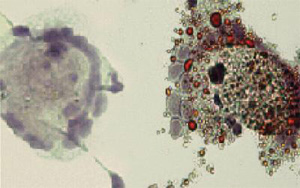If after reading this post you have questions regarding alternative medicine, integrative medicine, chiropractic, weight-loss, diabetes or pre-diabetes prevention, nutritional supplementation or how to become a new patient, please feel free to contact our office. Advanced Healing Center of Orange County, the practice of Dr. Marcus Ettinger BSc, DC. Phone: 714-639-4360, E-mail: info@advancedhealing.com, Mail: 630 South Glassell Street #103. Orange, CA 92866.
Vitamin D deficiency, levels lower than 32 ng’s/mL, is known to nearly double the risk of cardiovascular disease in patients with diabetes, and researchers at Washington University School of Medicine in St. Louis now think they know why.
Researchers have found that diabetics deficient in vitamin D can’t process cholesterol normally, so it builds up in their blood vessels, increasing the risk of heart attack and stroke. The new research has identified a mechanism linking low vitamin D levels to heart disease risk and may lead to ways to fix the problem, simply by increasing levels of vitamin D. Recent studies consider the lower limit of 32 ng/mL to be a threshold for optimum health. Hollis BW. J Nutr 2005 Feb 135 (2) :317-22.
“Vitamin D inhibits the uptake of cholesterol by cells called macrophages,” says principal investigator Carlos Bernal-Mizrachi, M.D., a Washington University endocrinologist at Barnes-Jewish Hospital. “When people are deficient in vitamin D, the macrophage cells eat more cholesterol, and they can’t get rid of it. The macrophages get clogged with cholesterol and become what scientists call foam cells, which are one of the earliest markers of atherosclerosis.”

A healthy macrophage cell, at left, with sufficient vitamin D. On the right, a macrophage with inadequate vitamin D has become clogged with cholesterol, an early marker of atherosclerosis.
Macrophages are a type of white blood cell that is dispatched by the immune system in response to inflammation and often are activated by diseases such as diabetes. Bernal-Mizrachi and his colleagues believe that in diabetic patients with inadequate vitamin D, macrophages become loaded with cholesterol and eventually stiffen blood vessels and block blood flow.Bernal-Mizrachi, an assistant professor of medicine and of cell biology and physiology, studied macrophage cells taken from people with and without diabetes and with and without vitamin D deficiency. His team, led by research assistants Jisu Oh and Sherry Weng, M.D., exposed the cells to cholesterol and to high or low vitamin D levels. When vitamin D levels were low in the culture dish, macrophages from diabetic patients were much more likely to become foam cells.
The research team reported that vitamin D regulates signaling pathways linked both to uptake and to clearance of cholesterol in macrophages.
“Cholesterol is transported through the blood attached to lipoproteins such as LDL, the ‘bad’ cholesterol,” Bernal-Mizrachi explains. “As it is stimulated by oxygen radicals in the vessel wall, LDL becomes oxidated, and macrophages eat it uncontrollably. LDL cholesterol then clogs the macrophages, and that’s how atherosclerosis begins.”
That process becomes accelerated when a person is deficient in vitamin D, and people with type 2 diabetes are very likely to have this deficiency. Worldwide, approximately one billion people have insufficient vitamin D levels, and in women with type 2 diabetes, the likelihood of low vitamin D is about a third higher than in women of the same age who don’t have diabetes.
The skin manufactures vitamin D in response to ultraviolet light exposure. But in much of the United States, people don’t make enough vitamin D during the winter — when the sun’s rays are weaker and more time is spent indoors.
The good news is when human macrophages are placed in an environment with plenty of vitamin D, their uptake of cholesterol is suppressed, and they don’t become foam cells. Bernal-Mizrachi believes it may be possible to slow or reverse the development of atherosclerosis in patients with diabetes by helping them regain adequate vitamin D levels.
“There is debate about whether any amount of sun exposure is safe, so oral vitamin D supplements may work best,” he says, “but perhaps if people were exposed to sunlight only for a few minutes at a time, that may be an option, too.”
Oh J, Weng S, Felton SK, Bhandare S, Riek A, Butler B, Proctor BM, Petty M, Chen Z, Schechtman KB, Bernal-Mizrach L, Bernal-Mizrachi C. 1,25 (OH) vitamin D inhibits foam cell formation and suppresses macrophage cholesterol uptake in patients with type 2 diabetes mellitus. Circulation, vol. 120(8);pp. 687-698. Aug. 25. 2009. Published online August 10, 2009 doi:10.1161/CIRCULATIONAHA.109.856070